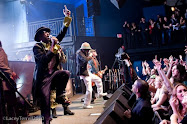 ARTS & EVENTS
ARTS & EVENTSEvolving Manifesto: Talib Kweli
Washington Post Express, October 20, 2008Written by Express contributor Alfredo Flores
Photo courtesy Blacksmith
TALIB KWELI DOESN'T sport platinum chains, hasn't invented a cool dance and doesn't rap about what vodka or energy-drink company he owns. He's a meat-and-potatoes MC, more into storytelling than swagger, spreading messages about self-love, self-esteem and self-worth with his socially conscious lyrics. But because he doesn't come out with radio-friendly ringtone rap often, he's dubbed as indie. "I've often balked at the term 'alternative hip-hop,'" Kweli said. "What I do is closer to the roots of hip-hop than most of the stuff you hear on the radio. I don't think what I do is alternative, but I've become an alternative to some of the radio bullshit you hear." Kweli's first exposure to hip-hop was while listening to Grandmaster Flash and other party-rap albums growing up in the 1980s in Brooklyn, a time when MCs were doing it for the love of hip-hop, with little promise of money. But times have changed, and several rappers have come into the industry wanting to be CEOs and executives before becoming good artists. "I did it backward," Kweli said. "I was creative first and now that I've grown into a man, I'm learning how to be more business-minded. In retrospect, I wish I would have been a bit more business-minded when I first came out, to be quite honest." Kweli can laugh about it now that he's successfully made the transition from underground to mainstream. As a kid, the raspy-voiced Kweli was heavily influenced by his professor parents' jazz records. He started his career as a fist-raising revolutionary,dictating in 1998's "The Manifesto" that "if you rhymin' for the loot, then you's a prostitute." His biggest hit to date, 2002's "Get By" — featuring the beats of a then mostly unknown producer named Kanye West — features biting political commentary about those with means and those without, striving to get a "piece of the pie." And in 2006's "More or Less" he hopes for "more rap songs that stress purpose with less misogyny and less curses, let's put more depth in our versus." His highest-selling album to date came also came in 2006 with "Eardrum," his first under his own Warner Bros.-backed Blacksmith label. It reached No. 2 on the Billboard album charts in its first week, but don't start mistaking Kweli for Soulja Boy. "There are times when you need to have music that doesn't have any logic to it, you just like the way it makes you feel and how it sounds. Soulja Boy is not any less hip-hop than Gang Starr. You make beats, you make hip-hop," Kweli said. "This shit is cool for the club, but my music is the hip-hop that I like to listen to. Sometimes y
 ou need music that speaks directly to what people are going through in these times, and I've been able to be good at that. I've had radio hits before, but my strong suit is making thought-provoking music." Most of Kweli's beats come from the hands of DJ Hi-Tek, who he has worked with since Black Star — the group he had with Mos Def — and will continue to do so in Reflection Eternal, a collaborative project that expects to release a new CD in 2009. But for the Hip-Hop Live tour that stops at 9:30 Club on Oct. 20, Kweli will be sharing the stage with the Rhythm Roots Allstars, a 10-piece band that plays funk, dancehall, Latin and Afrobeat, and in the past has backed Black Eyed Peas and Outkast. It'll be the first time Kweli has performed with a live band for a full tour, and he's enjoyed partnering up with Rhythm Roots, not to mention tourmates B.O.B. and David Banner. Kweli admits that he's a fan of Banner's hit "Like a Pimp" even if his own fan base may not like the message behind the song. But Kweli relishes the fact that the tour will offer a little something for all hip-hop fans. "We're all young black people doing hip-hop music," Kweli said. "People focus on the differences too much in hip-hop. In this particular tour, focusing on the differences is great because we're all on tour together and the differences are what make it more colorful." Perhaps an energy-drink rap isn't out of the question then. » 9:30 Club, 815 V St. NW; Mon., Oct. 20, 7 p.m., $25; 202-265-0930 (U St.-Cardozo).
ou need music that speaks directly to what people are going through in these times, and I've been able to be good at that. I've had radio hits before, but my strong suit is making thought-provoking music." Most of Kweli's beats come from the hands of DJ Hi-Tek, who he has worked with since Black Star — the group he had with Mos Def — and will continue to do so in Reflection Eternal, a collaborative project that expects to release a new CD in 2009. But for the Hip-Hop Live tour that stops at 9:30 Club on Oct. 20, Kweli will be sharing the stage with the Rhythm Roots Allstars, a 10-piece band that plays funk, dancehall, Latin and Afrobeat, and in the past has backed Black Eyed Peas and Outkast. It'll be the first time Kweli has performed with a live band for a full tour, and he's enjoyed partnering up with Rhythm Roots, not to mention tourmates B.O.B. and David Banner. Kweli admits that he's a fan of Banner's hit "Like a Pimp" even if his own fan base may not like the message behind the song. But Kweli relishes the fact that the tour will offer a little something for all hip-hop fans. "We're all young black people doing hip-hop music," Kweli said. "People focus on the differences too much in hip-hop. In this particular tour, focusing on the differences is great because we're all on tour together and the differences are what make it more colorful." Perhaps an energy-drink rap isn't out of the question then. » 9:30 Club, 815 V St. NW; Mon., Oct. 20, 7 p.m., $25; 202-265-0930 (U St.-Cardozo). 


























